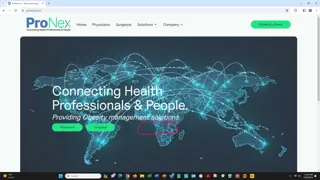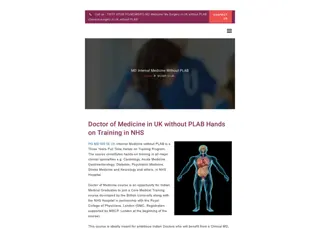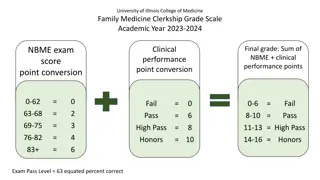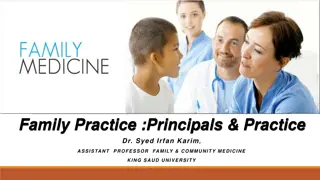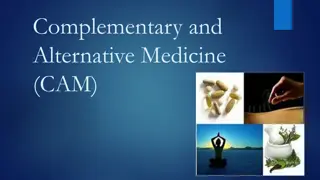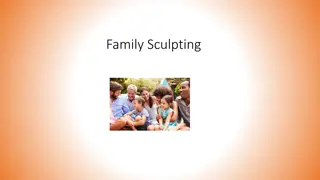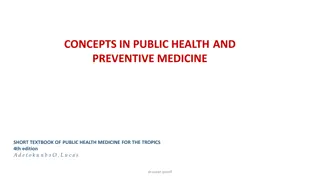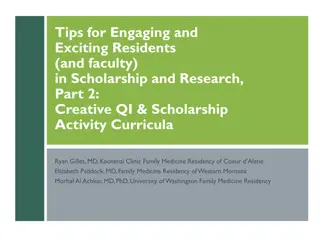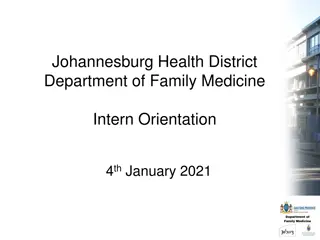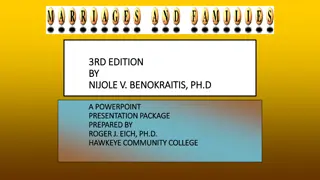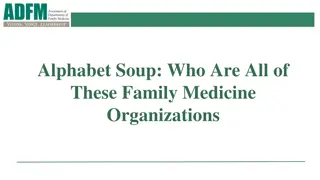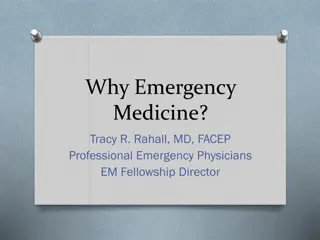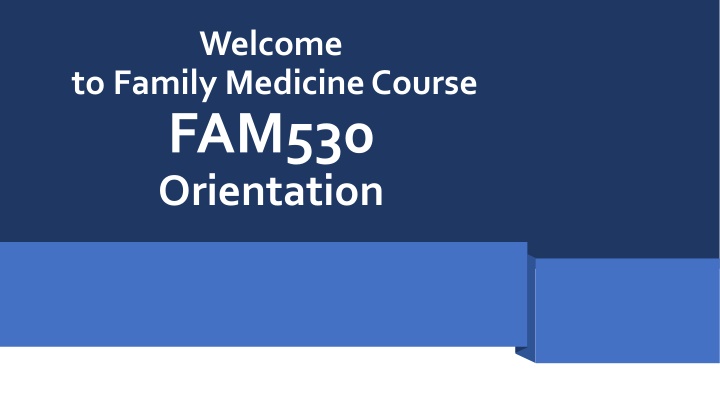
Family Medicine Course FAM530 Orientation Schedule and Guidelines
Explore the comprehensive schedule and guidelines for the Family Medicine Course FAM530 orientation, including learning outcomes, tutors, ground rules, and a three-week plan covering basic principles and clinical topics. Engage in communication, consultation, primary care, clinical skills, and exam preparations in a structured and supportive learning environment.
Download Presentation

Please find below an Image/Link to download the presentation.
The content on the website is provided AS IS for your information and personal use only. It may not be sold, licensed, or shared on other websites without obtaining consent from the author. If you encounter any issues during the download, it is possible that the publisher has removed the file from their server.
You are allowed to download the files provided on this website for personal or commercial use, subject to the condition that they are used lawfully. All files are the property of their respective owners.
The content on the website is provided AS IS for your information and personal use only. It may not be sold, licensed, or shared on other websites without obtaining consent from the author.
E N D
Presentation Transcript
Welcome to Family Medicine Course FAM530 Orientation
Tutors:- Dr. Khalid Al Quamaizi Dean College of Medicine Dr. Yousif Elgezoli, MRCGP-UK/ JMHPE- Maastricht. Consultant in Family Medicine. 0567234117 ygezoli1954@gmail.com Dr. Osama Al-Nafesa
Course Learning Outcomes Contents of the Course Family Medicine Course: FAM 530 Topics Schedule Objectives Teaching & Learning Strategies Assessment
Course Learning Outcomes (CLOs) Skills Knowledge Values & Understanding
Ground rules for the Course - What factors made this activity a success or more effective? Brainstorming:- Starting and finishing on time Coming prepared Listening to others without interruptions Participating
Saying when you dont understand When anyone is speaking, addressing the whole group and not just the teacher Switching off mobile phones Treating others contributions with respect Keeping personal issues out of the session Maintaining confidentiality within the group.
Three Weeks Plan Week-1: Tuesday-Thursday (Basic Principles). Week-2: - Clinical Week-3: - Clinical / OSPE/OSCE REVISIONS & EXAMS.
First Week PART-1: FM First Three days (Tuesday -Thursday) FM Principles & Concepts (Six Topics). 1. Communication / BBNs. 2. Consultation 3. PHC System 4. Prescribing/Referrals 5. EBM & 6. Prevention in Primary Care.
2nd. & 3d. Weeks. PART-2: Clinical Topics: (Approach to the following clinical topics: Theory & Clinical Skills) 1. HTN, 2. Sore throat. 3. Chest pain, 4. Child Well Care. 5. Thyroid disorders 6. LBP 7. B. Asthma, 8. Anemia 9. DM, 10. Dyslipidemia 11.Headache 12. Osteoarthritis 13. Abdominal pain 14. BPH 15. Comprehensive Geriatric Care 16. Depression & Anxiety 17. Smoking 19. Obesity 20. Dizziness. 21. UTI 18. ANC PART-3: Revision, Consolidation and Exam
A.Basic principles in PHC 1 PHC in Saudi Arabia Khalid 2 Consultation Khalid 3 Prevention in P.C. Khalid 4 Communication/Breaking Bad News Yousif 5 Evidence-Based Medicine Khalid 6 Prescribing/Referrals in PC Khalid
B- Clinical Topics 1 2 3 4 5 6 7 8 9 DM Geriatric Care Depression/Anxiety Obesity Osteoarthritis Sore throat Dyslipidaemias Thyroid Headache Khalid Khalid Khalid Khalid Khalid Osama Osama Osama Osama
10 UTI/BPH 11 WBC 12 HTN 13 Headache 14 LBP 15 Thyroid disorders 16 Abdominal Pain 17 Chest Pain 18 Smoking 19 Dizziness 20 ANC Yousif Yousif Yousif Yousif Yousif Yousif Yousif Yousif Yousif Yousif Yousif
A.Tutorials:- 1 2 3 4 5 6 7 8 9 10 11 12 DM Dizziness Sore throat Headache/Cranial nerves Hypothyroidism/Neck exam. Chest pain HTN B. Asthma Abdominal pain O. Arthritis Knee exam. Khalid/Yousif Yousif Osama Osama Osama Yousif Yousif Khalid/Yousif Yousif Khalid LBP Yousif Depression Yousif
A.OSPE/OSCE 1 Mock Yousif 2 Revision Yousif
Teaching & Learning Strategies We should have strategic teaching from our side (Tutors) and strategic learning from your side (Students)
Very Active and Deep Teaching/Learning First Six Topics: 1. Consultation & Communication. 2. Breaking Bad News 3. Primary Health Care 4. Prescribing/Referrals. 5. Screening 6. EBM All topics are based on specific objectives Interactive presentation, based on the specific questions Your participation and prior reading is very important You will achieve very high in knowledge, skills competencies as well as in assessment
Teaching/Learning Strategies (Second 19 Topics) All ------ students will be divided into 4 groups of --- + --- students Daily we will discuss two/three topics all about applied theory. You will be provided with the power points, applied questions, 1-2 reference and a clinical scenario, possibly an article. All topics are based on their specific objectives. Your participation and prior reading is very important, and essential.
Example of a Case A 50-year-old gentleman is presented to your clinic with the complaint of hesitancy, urgency and increase frequency of urination for past few month. He is not known to have any medical problem in the recent past. No previous investigation is available. Discussion Questions: 1. What are the differential diagnosis of such presentation? 2. What are the questions to be included in taking history from the patient? 3. What are the clinical examinations to be performed? 4. What are the management plan for such case? 5. What are the complications if this patients has been diagnosed as BPH? ALL 20 CLINICAL PROBLEMS ARE BASED IN THIS STYLE for theoretical sessions. Same things will be applied for the clinical sessions with simulated patients.
Assessment 1. Active clinical participation 30% 2. OSPE/OSCE . 30% 3. MCQ Paper 40%
First Six Topics by MCQs I. FM Principles & Concepts (Six Topics) 1. Consultation. 2. PHC System 3. Communication/Breaking Bad News 4. Prevention in PHC. 5. Prescribing/Referrals & 6. EBM.
Second 20 Topics by MCQs & OSPE/OSCE Clinical Topics: (Approach to the following clinical problems) 1. HTN, 2. Sore throat. 3. Chest pain, 4. Well child care. 5. Thyroid, 6. LBP 7. SOB, 8. Anemia 9. DM, 10. Dyslipidemia 11. OA, 12. Headache 13. ANC 14. Abdominal pain 15UTI 16. Comprehensive Geriatric Care 17. Common psychiatric problems 18. Smoking 19. Obesity 20. Dizziness. 21. UTI.
Continuous Clinical Assessment (30%) There will be a continuous assessment, this will score 30% = 30 marks out of the 100 marks. Student will be asked questions individually, to get their assessment. If you are absent even with some valid reasons your mark will be decreased. There are 6 Assessment Specific Domains for attendance:
1 2 A L1 Attend on time Come late 15 minutes 3 L2 Come late 30 minutes 4 AB Absent 5 D Disturb, side talk or use mobile 6 LE Left Early
FAM 530 Continuous Assessment First Semester- Group B- Girls 5/11 02/12/2024. Absent X Dist. - Partic. P Bonus + Late or early x Att. 172220380 1 181220136 2 181220202 3 191220013 4 191220027 5 191220057 6 191220146 7 191220191 8
Group-Leader Roles:- Lead & facilitate constructive communication between the tutors and students. Receive and distribute the send materials sent through email (PowerPoint/Questions for discussion/references). Allocating & managing resources including the tools & instruments needed for clinical sessions. Be sure and prepare the smart board, the stability of the net & the needed audiovisual materials.
Upload the PowerPoint & videos to the smart board. Contact & direct poor attending students. Help in distributing the group into subgroups.
Instruments and tools needed for the course - Clinical- FAM-530 1. Audiovisual facilities i.Smart Board ii.Projector iii.Loud Speaker iv.Internet facilities v.PPT and Video presentation
Clinical Instruments i.Stethoscope ii.Sphygmomanometer iii.Placebo Inhaler iv.Peak Flow Meter v.Auroscope vi.Urine dipstick vii.Glucometer
i.Torch and tongue depressor ii.BMI chart, Blood sugar convertor chart iii.Framingham Risk Calculation Chart iv.Smoking Device Calculator for CO/ NRT patches v.CNS Evaluation instrument 1.Tuning Fork 2.Hammer 3.Cotton and needle 4.Microfilament to check DM foot
Summary 1. Be on time, active, prepared, and mobile mute 2. Read daily, No absenties 4. Outcomes of these hard work will reflect on your knowledge, skills assessment results 3. Learn how to learn and prepare
PERFORMANCE OF STUDENTS IN FAM 530- NOV EXAM FOR THE ACADEMIC YEAR 1437 - 38 H. ALL STUDENTS 30% 26% 20% 10% 6% 6% 0% 0% 2% A+ A B+ B C+ C D+ D FAILED
References Swanson s /A Problem-Oriented Approach-FAMILY MEDICINE REVIEW- 9th. Edition Required Textbooks (Alfred F. Tallia / Joseph E Scherger / Nancy W. Dickey -2023). OSCE AID for Family Medicine Saudi Board Program Family Medicine Guide Handbook (Dr. Hadi Alenazy / Dr. Abdulelah Shihab) Methods of Medical Examination (Prof. M. Salah Ibrahem). Essential References Materials https:// amboss.com Links for Videos From Saudi Commission for Health Specialities on BBNs/Well & Bad Consultations/ Dix-Halpike & Epley Cranial nerves exam Diabetic foot exam Knee exam SLR etc. Electronic Materials Other Learning Materials BMJ, American Family Physician, NICE Guidelines, SIGN Guidelines, SHAMS, SINA Guidelines 2024. BMJ Best Practice.
Thank you Thank you


